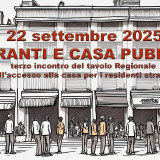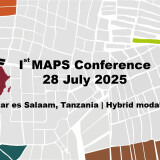VoiceOver Project: Repository of Key Products
In this page you can find all the key documents and tools produced within the VoiceOver Project:
PATHWAYS TO SURVIVOR ENGAGEMENT
This document presents the plans of the five VoiceOver partners—victim-support organizations—focused on the engagement of survivor leaders, including participant recruitment, peer mentoring, leadership training, and peer-led workshops. The main goal of defining and sharing these plans before launching the training paths was to build a shared, practice-based framework for engaging trafficking survivors.
EXPERT TALKS.
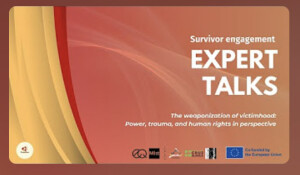 A series of 6 short video interviews and presentations featuring scholars, practitioners, and activists working in the fields of victim support, survivor engagement, and anti-trafficking policies. These conversations provide critical insights and diverse perspectives on how to meaningfully involve trafficking survivors in decision-making processes. Designed both as a learning tool for project partners and a resource for the broader community, the Expert Talks aim to inspire reflection, foster dialogue, and strengthen participatory practices in the anti-trafficking field.
A series of 6 short video interviews and presentations featuring scholars, practitioners, and activists working in the fields of victim support, survivor engagement, and anti-trafficking policies. These conversations provide critical insights and diverse perspectives on how to meaningfully involve trafficking survivors in decision-making processes. Designed both as a learning tool for project partners and a resource for the broader community, the Expert Talks aim to inspire reflection, foster dialogue, and strengthen participatory practices in the anti-trafficking field.
Expert Talks episodes
- The weaponization of victimhood: Power, trauma, and rights in perspective (c.a. 35’) > Lilie Chouliaraki, Professor of Media and Communication at the London School of Economics, in conversation with Carrie Pemberton Ford, Director of the Cambridge Center for Applied Research on Human Trafficking, explores the role of voice, legitimacy, and communication in humanitarian and anti-trafficking contexts, with a particular focus on how the narratives of survivors are legitimized within systems of global governance and public discourse
- The ethical challenge of securing survivor voice (c.a. 46’) > Dr. Carrie Pemberton Ford, Director of the Cambridge Centre of Applied Research in Human Trafficking (CCARHT), examines various models of survivor inclusion and the political and systemic challenges that shape the integration of survivor voices
- Ethical storytelling in human trafficking (c.a. 12’) > Mariam Awori from the Kenyan survivor-led organization Azadi discusses how narratives shape public perceptions and policies, addressing problematic terms such as “victim” and “heroic survivor,” among others.
- The foundations: connecting and mobilizing survivors (c.a. 25’) > Flora Enifo, Co-Founder and Community Manager at MIST, a survivor-led anti-trafficking NGO based in Paris, shares insights on the foundations of survivor engagement and how to connect and mobilize individuals with lived experience.
- Therapeutic complexity, resilience and trauma transformation (c.a. 30′) > Professor Renos K. Papadopoulos, a distinguished clinical psychologist, Jungian psychoanalyst, and expert in refugee care, discusses therapeutic complexity, resilience, and trauma transformation.
- Ethical research with trafficking survivors (c.a. 13′) > Professor Michela Semprebon, sociologist at the University of Parma (Italy) and main researcher of INSigHT project delves into the ethics of conducting responsible research with individuals who have lived experience of trafficking.
TOWARDS A SURVIVOR ENGAGEMENT MODEL
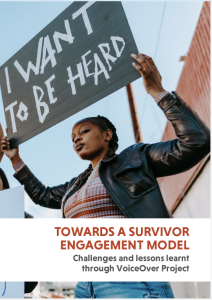 “Towards a Survivor Engagement Model – Challenges and lessons learnt through VoiceOver Project” is a reflective document that brings together experiences, strengths, and challenges from the survivor leader engagement processes promoted by the VoiceOver project. It is titled “Towards” because it does not present a finalized or universally replicable model, but rather a meaningful account of the efforts made to include survivor leaders in anti-trafficking activities. The description of the various training paths implemented by each partner offers valuable insights into how to build ethical, trauma-informed, and structured approaches to survivor involvement. Built around the dual focus of creating safe spaces and empowering survivors, the process of developing the model has itself become part of its identity. Further experimentation is needed before it can be considered a fully replicable or transferable approach.
“Towards a Survivor Engagement Model – Challenges and lessons learnt through VoiceOver Project” is a reflective document that brings together experiences, strengths, and challenges from the survivor leader engagement processes promoted by the VoiceOver project. It is titled “Towards” because it does not present a finalized or universally replicable model, but rather a meaningful account of the efforts made to include survivor leaders in anti-trafficking activities. The description of the various training paths implemented by each partner offers valuable insights into how to build ethical, trauma-informed, and structured approaches to survivor involvement. Built around the dual focus of creating safe spaces and empowering survivors, the process of developing the model has itself become part of its identity. Further experimentation is needed before it can be considered a fully replicable or transferable approach.
download here “Towards a Survivor Engagement Model”
SHOWCASING WORKSHOP ACTIVITIES AND RESULT
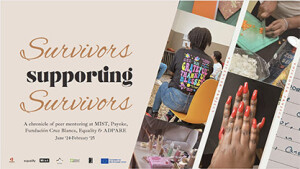 As foreseen by the project, following the training and empowerment phase, survivor leaders organized and facilitated workshops with beneficiaries of anti-trafficking systems in the five partner countries. These slides summarize the number and type of workshops conducted in each context, the number of survivor leaders involved in peer-to-peer activities, and the number of individuals currently engaged in protection and assistance programmes who participated.
As foreseen by the project, following the training and empowerment phase, survivor leaders organized and facilitated workshops with beneficiaries of anti-trafficking systems in the five partner countries. These slides summarize the number and type of workshops conducted in each context, the number of survivor leaders involved in peer-to-peer activities, and the number of individuals currently engaged in protection and assistance programmes who participated.
The workshops covered a wide range of topics—from dance and cooking to photography and poetry writing. However, what truly matters is not the content itself, but the impact: these workshops stand as a powerful demonstration of how peer mentorship can foster meaningful survivor engagement.
RECOMMENDATIONS FOR ENHANCING SURVIVOR ENGAGEMENT IN ANTI- TRAFFICKING EFFORTS
 This document summarizes the outcomes of focus groups conducted with survivors and specialists to promote mutual learning and support service innovation. The aim is to implement survivor engagement recommendations from the Survivor Expert Panel after the VoiceOver project ends. Building on prior experience and lessons learned—particularly through the MIST approach—partner organizations have developed context-specific recommendations to strengthen survivor involvement in peer support, leadership, and anti-trafficking policymaking.
This document summarizes the outcomes of focus groups conducted with survivors and specialists to promote mutual learning and support service innovation. The aim is to implement survivor engagement recommendations from the Survivor Expert Panel after the VoiceOver project ends. Building on prior experience and lessons learned—particularly through the MIST approach—partner organizations have developed context-specific recommendations to strengthen survivor involvement in peer support, leadership, and anti-trafficking policymaking.
UNMUTE -Towards meaningful survivor engagement
 Unmute is a powerful call to action for the anti-trafficking community. This video highlights the importance of survivor engagement, flipping the narrative to center the voices of those with lived experience. It’s a reminder to create meaningful spaces for survivors to lead and participate in decision-making. Together, we can amplify their voices and ensure their stories drive change.
Unmute is a powerful call to action for the anti-trafficking community. This video highlights the importance of survivor engagement, flipping the narrative to center the voices of those with lived experience. It’s a reminder to create meaningful spaces for survivors to lead and participate in decision-making. Together, we can amplify their voices and ensure their stories drive change.

